- Home
- Alan MacDonald
Sir Bigwart
Sir Bigwart Read online
Contents
Foreword
Chapter 1 Marrying Marigold
Chapter 2 Bigwart the Brave
Chapter 3 Knight of the Bedchamber
Chapter 4 The Runaway Princess
Chapter 5 Whispering Wood
Chapter 6 An Odour of Ogres
Chapter 7 The Wizard Firkin
Chapter 8 Marigold Gets Lost
Chapter 9 A Very Hairy Climb
Chapter 10 Whoman Stew
Chapter 11 A Horrible Way to Go
Chapter 12 Eggnog Again
Other titles in the History of Warts series
By the Same Author
Foreword
by
Professor Frank Lee Barking (M. A. D. Phil)
Since the dawn of time members of the hapless Wart family have been dogged by disaster. From facing flesh-eating ogres to grappling with gladiators and being kidnapped by pirates, Warts have looked Death in the eye and lived to tell the tale. Now, thanks to years of painstaking research, and literally hours of daydreaming, I am proud to bring you the absolutely true and epic saga of …
The History of Warts
Chapter 1
Marrying Marigold
‘Odds frogs!’ exclaimed King Eggnog the Eighth. ‘At this rate there won’t be any princes left to marry!’
‘No indeed, sire,’ agreed Lord Fawnley. ‘Prince Frederick wrote to cancel his visit next week. Apart from Prince Bobbins he was the last on our list.’
‘Prince Bobbins? What’s wrong with him?’ asked the King.
‘He’s six months old, my lord. I’m told he dribbles.’
The King paced up and down his throne room. It was a vexing problem. Princess Marigold was his only child and he loved her dearly, but one day she would sit on the throne of Eggnog. In his view it was high time she met a handsome prince and got married – after all, she was eleven years old. (King Eggnog never considered that his daughter could look after a kingdom perfectly well by herself. A kingdom needed a king, he said, or else it would be a queendom, which didn’t sound right at all.)
‘Perhaps, my lord, the Princess isn’t ready for marriage yet,’ said Lord Fawnley.
‘Poppycock!’ said the King. ‘A princess without a prince is like a … a knight without a nightie.’
‘Yes, sire, but if the Princess refuses to take one?’
‘A nightie? She has hundreds of them!’
‘No, sire. I meant a husband.’
‘Well, that is why I’m asking you, Fawnley. You are my Lord Chamberlain, you’re meant to advise me. Think, man. We need a thingummywot.’
‘A plan, sire?’
‘That’s the fellow – a plan.’
There was a long silence while Lord Fawnley gave the matter some deep thought, stroking his pointed beard. Beards were in fashion among the knights of Eggnog and Lord Fawnley kept his as neatly trimmed as a lawn. He glanced in the mirror and remembered he was meant to be thinking.
‘I think I may have it, sire,’ he said.
‘Go on.’
‘A quest.’
‘Ah, a quest! Excellent! And how would that work exactly?’ asked the King, who hadn’t the faintest clue what Lord Fawnley was talking about.
‘I believe they are very popular with knights these days, sire. Usually they involve a long and dangerous journey with some kind of deadly peril waiting at the end.’
‘Such as marrying the Princess Marigold, you mean?’
‘No, my lord. Such as slaying a dragon or breaking a curse – that kind of thing.’
The King frowned. ‘I see, but how is that going to help Marigold?’ he asked.
‘I was coming to that, sire. The knight who completes this quest will prove himself the bravest in the land. What greater reward than claiming the Princess as his bride.’
‘Excellent!’ said King Eggnog. ‘But just one thing – if there are dragons and so forth what if the brave knight comes back missing his head?’
Lord Fawnley smiled. ‘That’s the beauty of it, sire, we just send someone else. Don’t forget you have one hundred knights. I’m sure they’re only too eager to prove their worth.’
‘Fawnley,’ said the King, ‘you are not as stupid as you look.’
The Lord Chamberlain bowed. ‘You are too kind, my lord.’
‘We shall proclaim the quest tonight,’ said King Eggnog. ‘Tell the court to gather in the Great Hall at supper. Oh, and I nearly forgot, Fawnley – the deadly peril. What’s that going to be?’
Lord Fawnley smiled to himself. ‘Oh, leave that to me, Highness. I think I know just the thing.’
Chapter 2
Bigwart the Brave
The knights of Eggnog did not know that one of them was about to set forth on a dangerous adventure. If they had, they might have found some excuse to stay away from court that evening. Not one of them had ever fought a fire-breathing dragon or rescued a damsel from anything more distressing than a puddle. The truth was they were a spineless bunch of cowards. Ten of them were scared of spiders, seven didn’t like the dark and at least one could never get to sleep without a bedtime story. Most of the time they stayed in the castle, feasting, drinking and playing games in the Great Hall. Their favourite game was indoor jousting, which is much like outdoor jousting except that no one gets hurt. It is played by two knights who each ride piggy-back on one of their friends. The knights charge at each other, armed with mops and buckets, and usually end up in a messy heap on the floor.
The knight who invented this game was called Sir Bigwart. Sir Bigwart had round, rosy cheeks and a nose like a knobbly potato. His armour was old and so rusty at the joints that it almost matched the red of his beard. At present his helmet was out in the stables, where a hen had laid five speckled eggs inside it.
Despite his failings, Sir Bigwart had one great talent and that was boasting. Once a year, usually in the spring, Sir Bigwart would set out from the castle, telling his friends that he was setting off in search of adventure. A few days later he would return with tales of the marvels he had seen and the daring deeds he had performed. In actual fact he never went further than the village tavern, where the bravest thing he did was fall into bed and snore till noon.
That evening there was a buzz of excitement as the knights gathered in the Great Hall. Word had already gone round that the King intended to make a royal proclamation. The King’s high table wasn’t big enough to seat all one hundred knights so a number had to stand, which always led to pushing and squabbling and sometimes to the table’s wonky leg giving way at the most embarrassing moment. (This was the reason why King Eggnog’s courtiers were known far and wide as the Knights of the Wonky Table.)
When everyone was seated, a herald stepped forward and began to read the proclamation.
‘His Royal Majesty King Eggnog the Eighth, Most High and Mighty Lord of the Three Kingdoms, Duke of Camembert, Earl of Dripping …’
‘Yes, yes,’ said the King, waving a hand impatiently. ‘We can skip the introductions and get on to the important bit.’
The herald looked peeved and began again. ‘His Royal Majesty King Eggnog the Eighth and so on and so on … proclaims a quest. Whosoever shall complete this quest may claim the hand of Her Royal Highness Princess Marigold in marriage.’
Princess Marigold jumped to her feet, her eyes blazing. ‘WHAT?’ she thundered.
‘Oh Marigold, my sweet, I didn’t see you there,’ said the King.
‘You’re going to give me away?’ fumed the Princess. ‘Make me the prize in one of your stupid games?’
‘Well, no, my buttercup, it’s not a game, it’s called a quest …’ stammered the King.
The Princess picked up a bowl of venison soup and drew back her arm.
‘I don’t care what it’s
called!’ she shrieked. ‘If you think I’m marrying one of your pea-brained knights, you can think again!’
CRASH! The plate narrowly missed the King’s head, splattering the wall with brown soup.
‘Now, now, my pigeon,’ said the King, ducking below the table. ‘Can’t we talk sensibly about this?’
Smash! A bowl of elderflower jelly hit the wall, followed by a mutton pasty.
‘Help!’ cried the King. ‘Guards!’
Two of the palace guards stepped forward and seized the Princess by the arms. She was dragged protesting from the room before anything else got broken (the King’s nose, for example).
‘Thank goodness!’ sighed the King. ‘Now, where were we?’
‘You were offering the Princess’s hand, my lord,’ prompted Lord Fawnley.
‘Ah yes,’ said the King. ‘And remind me, what is this quest going to be exactly?’
Lord Fawnley stood up and waited for silence. ‘The knight who wishes to win the hand of Princess Marigold,’ he said, ‘must slay the Ogres of Ghastly Fell.’
A deathly silence fell over the room, broken only by a dull clunk! as the wonky table leg gave way and one hundred bowls of soup slid to one end. The knights sank lower in their chairs. None of them had ever set eyes on an ogre and they wanted to keep it that way. Ogres were like giants only much much worse. If you were lucky you might run into a good-natured giant on your travels, but friendly ogres did not exist. Ogres were bone-crunching brutes who ate knights for breakfast. And of all the ogres in the land none were as fearsome as the Ogres of Ghastly Fell. These ogres were twin brothers, which meant they were double the trouble – and probably triple the smell.
King Eggnog smiled pleasantly. ‘So. Which of you brave knights wishes to take up the challenge? Step forward – don’t be shy.’
The knights of Eggnog stared at the table and fiddled with their napkins.
‘Come, Sir Horace. What about you?’ asked the King.
‘Nothing would give me greater pleasure, my lord,’ blustered Sir Horace, ‘but my sword is at the blacksmith’s and won’t be back till the end of the month.’
‘Sir Runcible, what about you?’ asked the King.
‘Alas, my horse stumbled in a ditch yesterday, my lord. It has gone lame.’
‘What rotten luck!’ said the King. ‘But Sir Cardigan, surely you will go?’
Sir Cardigan pulled out a hanky and blew his nose. ‘I would, by lord, but I hab the most tebbible cold.’
‘Oh, this is ridiculous!’ said King Eggnog. ‘You are meant to be the bravest and boldest knights in the land. Surely one of you will go?’
Lord Fawnley had noticed one of the knights had left the table and was trying to sneak out of the room on all fours.
‘Sir Bigwart!’ he called out. ‘What about you?’
‘Me?’ said Sir Bigwart, raising his head as everyone turned in his direction.
‘Yes,’ said Lord Fawnley. ‘Remember that giant you fought only last year? You told us all about it.’
‘Ah yes,’ said Sir Bigwart, getting to his feet sheepishly. ‘But he was only a small giant – not much bigger than an oak tree really.’
‘Come now, Bigwart, don’t be so modest,’ smiled Sir Horace. ‘I remember you telling me you’ve always wanted to meet an ogre face to face.’
‘Er … did I?’ mumbled Sir Bigwart.
‘Yes! You said if you ever met one, you’d slice him into sausage meat.’
The other knights around the table murmured in agreement. They had all heard Sir Bigwart making boasts of this kind.
‘Well, of course,’ said Sir Bigwart, ‘slaying an ogre or two would usually be no trouble at all for a knight like myself, but –’
‘Excellent!’ interrupted King Eggnog. ‘Then that’s settled. Go home and pack what you need for the journey. We will all be there to see you off in the morning. And remember, when you come back triumphant, Princess Marigold will be waiting for you.’
‘Oh, ah … thank you, sire,’ said Sir Bigwart feebly.
He couldn’t decide which was worse: facing a pair of flesh-eating, blood-dripping ogres or Princess Marigold in a temper.
Chapter 3
Knight of the Bedchamber
Sir Bigwart lived in a large, draughty manor house with his mother. The next morning Lady Alice searched everywhere for him and eventually she found him hiding under a bed.
‘There you are, Biggy!’ she exclaimed. ‘What on earth are you doing?’
‘Shhh!’ replied the brave knight. ‘I’m not here!’
‘Well, of course you are, you big lump! I can see you. Come out!’
‘I can’t, Mother! If anyone knocks on the door, you don’t know where I am.’
‘You’re under the bed!’
‘No I’m not!’
‘You are! I can see your bottom sticking out.’
Sir Bigwart made an effort to pull in his bottom but there wasn’t much room under the bed for a knight of his proportions so he only succeeded in bumping his head.
‘Ow!’ he hissed. ‘Go away, Mother! I’m trying to hide.’
‘Hide? From who?’
‘From the King. From everyone. They want me to go on a horrible quest.’
‘Well, I know, dumpling – everyone at court’s talking about it,’ said Lady Alice. ‘I’m coming to the castle gates to wave you off.’
Sir Bigwart sighed heavily. ‘Mother, I’m not going! It’s certain death. They want me to slay the Ogres of Fell.’
‘Goodness!’ tutted Lady Alice. ‘What a fuss over a silly old ogre!’
‘Two silly old ogres if you don’t mind,’ objected Sir Bigwart huffily.
‘What’s the difference? They’re only ogres! Are you coming out or not?’
‘Not,’ said Sir Bigwart stubbornly.
‘Please yourself,’ said Lady Alice. ‘Then I suppose you won’t be wanting any breakfast?’ Lady Alice knew her son well and if there was one word that could tempt him out from under a bed it was the word breakfast. (The words lunch, supper and elevenses had a similar effect.)
‘What sort of breakfast?’ he asked.
‘Honey cakes. Your favourite.’
‘I’m not hungry,’ replied the knight.
‘Good. All the more for me then.’
Soon after there was a knock on the door and a kitchen boy entered, bringing a plate piled high with honey cakes, fresh out of the oven. The boy’s name was Crispin. He was a cheerful boy with a round, innocent face and a haircut that resembled an upside-down pudding bowl. He had baked the honey cakes himself. (He did almost everything in the kitchen since the cook was extremely short-sighted. She had once put the cat in the oven, mistaking it for a plucked chicken.)
Under the bed, Sir Bigwart could hear his mother munching away and giving little sighs of pleasure. There is nothing worse, he thought, than listening to someone slurping honey cakes when you are starving hungry.
‘How are they?’ he asked.
‘Delicious. Light as a feather,’ said Lady Alice. A crumb dropped on the floor. A hand sneaked out from under the bed and the crumb vanished. A moment later Sir Bigwart’s head appeared, followed by the rest of his body.
‘So,’ said Lady Alice, when they had both sat down. ‘When do you set off?’
Her son looked miserable. ‘I’m not going anywhere. They want me to slay an ogre, Mother. Two ogres. I could quite possibly die.’
‘Don’t be such a big softie,’ said his mother. ‘What about that seven-headed dragon you killed?’
‘Ogres are different,’ grumbled Sir Bigwart.
‘Nonsense! Have you ever seen one? People think ogres are huge, horrible blood-sucking brutes, but they might be harmless as kittens. How many people do you know who have actually met an ogre in the flesh?’
‘None,’ said Sir Bigwart gloomily. ‘They’re probably all dead.’
‘Look on the bright side,’ said Lady Alice, taking another honey cake. ‘If you succeed, you’ll be famous.’
‘Of course! The King will throw a banquet in your honour and I’ll be able to buy a new hat.’
‘A hat? What on earth for?’
‘For your wedding, silly – to Princess Marigold.’
‘Oh, that!’ groaned Sir Bigwart.
‘Have you thought what it would mean – marrying a princess?’
‘Yes. I’d never get any peace.’
‘It would mean you wouldn’t be a common knight any more, you’d be a prince. Prince Bigwart. How does that sound?’
Sir Bigwart liked the sound of it. If he was a prince, he would have his own royal coat of arms and an army of servants to wait on him hand and foot. All the other knights would have to stand up when he entered a room. Instead of ‘Warty’ and ‘Bignose’ they’d have to call him ‘sire’ and ‘my lord’. Even that fathead Lord Fawnley. Maybe his mother was right. A quest wasn’t such a bad idea. After all, he didn’t have to actually fight any ogres – he could just ride around looking for them (or, better, still pretending to look for them). There was only one drawback – Ghastly Fell lay to the north of the kingdom. That meant crossing the Whispering Wood and he didn’t fancy going there by himself either.
‘It’s no good,’ he said. ‘I don’t have a squire. Knights never set off on a quest without a squire.’
‘But Biggy, darling, where are we going to find a squire before tomorrow?’ asked Lady Alice.
Sir Bigwart helped himself to the last of the cakes. Eating helped him think. Where could they find a suitable squire? Someone brave, loyal and good at handing you things – like honey cakes, for instance. At that moment there was a knock on the door and Crispin returned.
Lady Alice clapped her hands. ‘Of course! Crispin! He can be your squire!’
‘Crispin?’ said Sir Bigwart. ‘But he’s the kitchen boy! I can’t take him!’
Crispin looked disappointed. It was true he didn’t look much like a squire. He was dressed in a mud-brown tunic and a filthy apron stained with eggs, flour and gravy. His hair – as we’ve already mentioned – looked like it had been cut by a mad butcher.

 Zombie!
Zombie!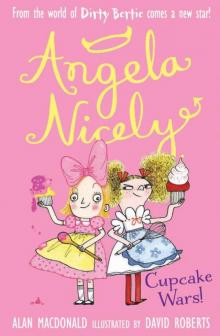 Cupcake Wars!
Cupcake Wars!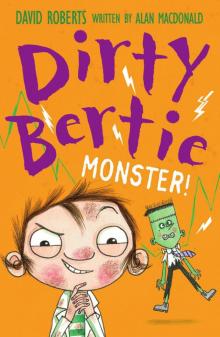 Monster!
Monster!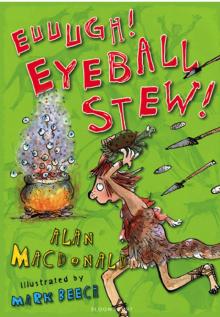 Euuuugh! Eyeball Stew!
Euuuugh! Eyeball Stew!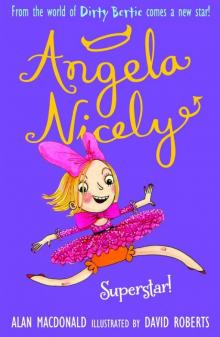 Superstar!
Superstar!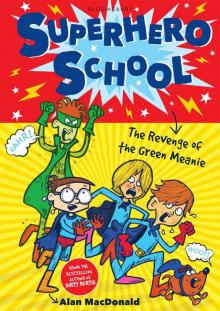 Superhero School
Superhero School Pong!
Pong!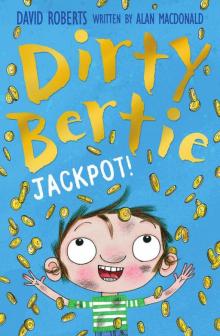 Jackpot!
Jackpot! Aliens!
Aliens!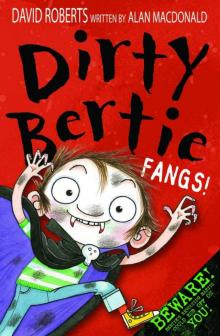 Fangs!
Fangs!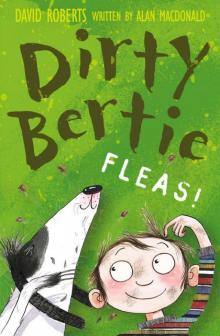 Fleas!
Fleas!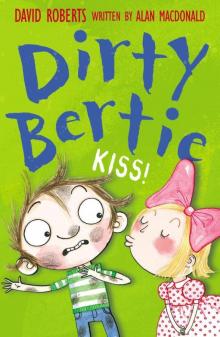 Kiss!
Kiss!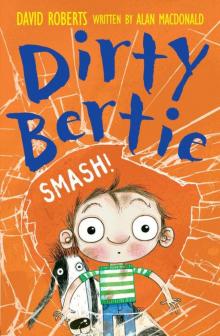 Smash!
Smash!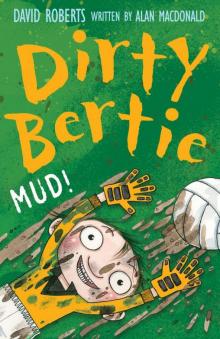 Mud!
Mud!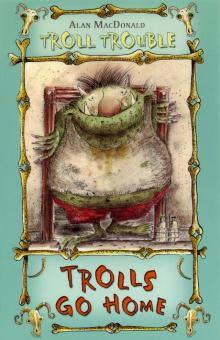 Trolls Go Home!
Trolls Go Home!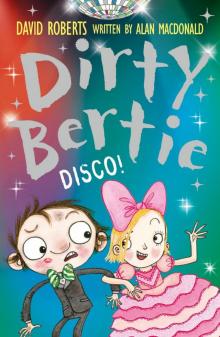 Disco!
Disco!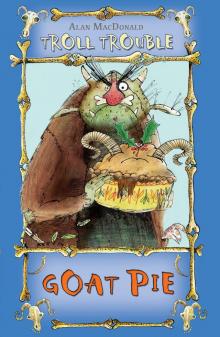 Goat Pie
Goat Pie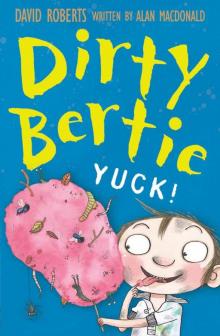 Yuck!
Yuck!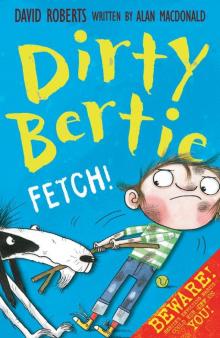 Fetch!
Fetch!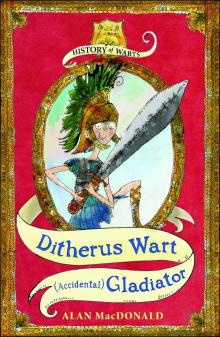 Ditherus Wart
Ditherus Wart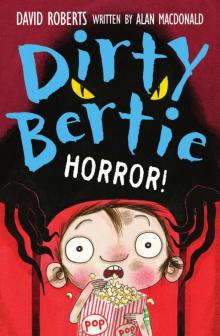 Horror!
Horror! Pirate!
Pirate!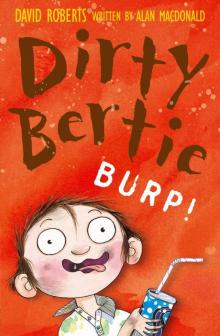 Burp!
Burp!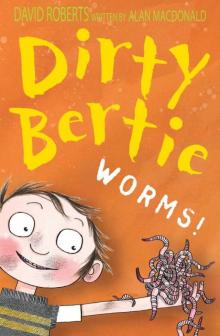 Worms!
Worms!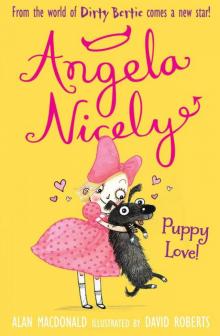 Puppy Love!
Puppy Love!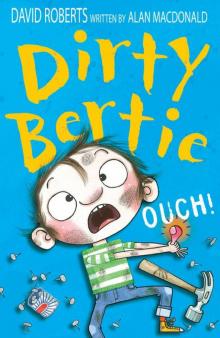 Ouch!
Ouch! Alien Attack!
Alien Attack!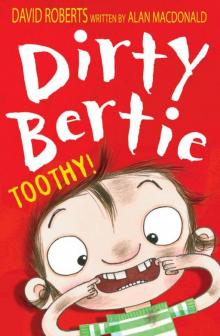 Toothy!
Toothy!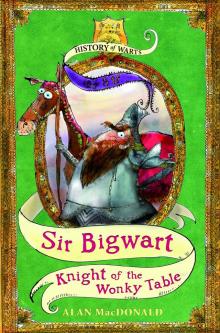 Sir Bigwart
Sir Bigwart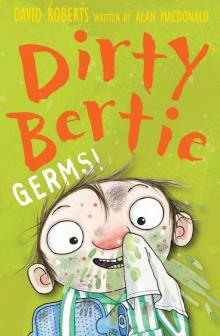 Germs!
Germs!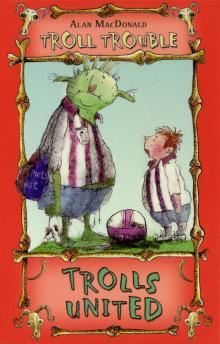 Trolls United
Trolls United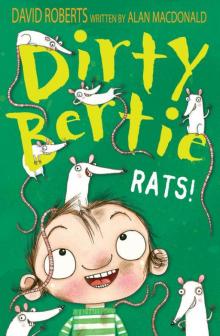 Rats!
Rats!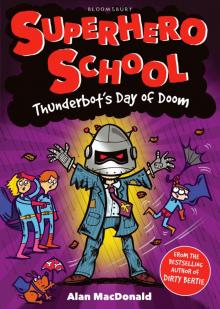 Thunderbot's Day of Doom
Thunderbot's Day of Doom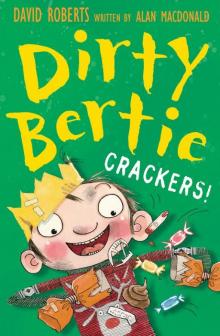 Crackers!
Crackers!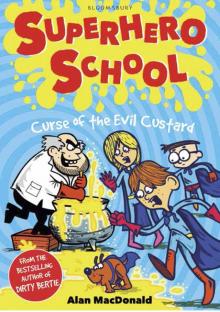 Curse of the Evil Custard
Curse of the Evil Custard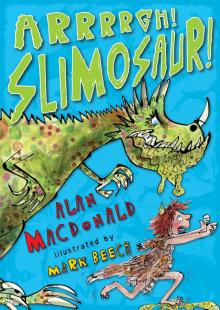 Arrrrgh! Slimosaur!
Arrrrgh! Slimosaur!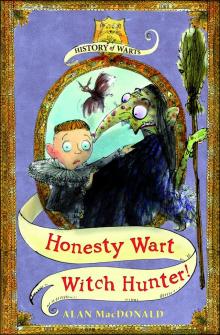 Honesty Wart
Honesty Wart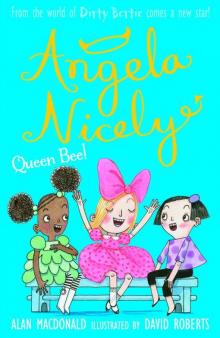 Queen Bee!
Queen Bee! Snow!
Snow!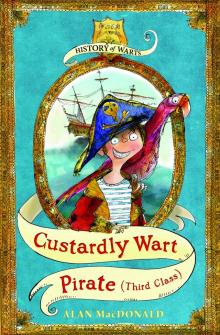 Custardly Wart
Custardly Wart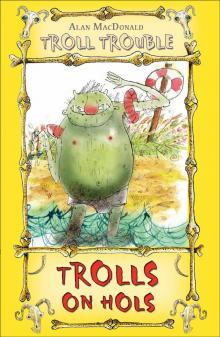 Trolls on Hols
Trolls on Hols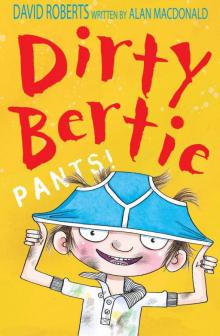 Pants!
Pants!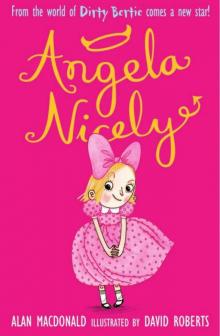 Angela Nicely
Angela Nicely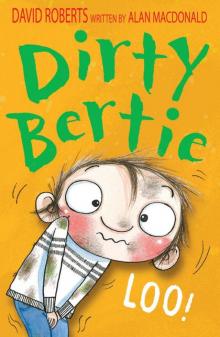 Loo!
Loo!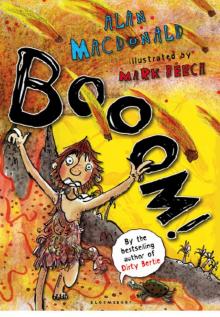 BOOOM!
BOOOM!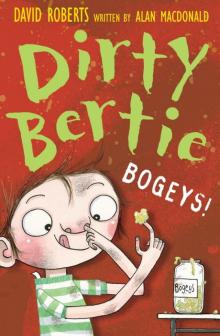 Bogeys!
Bogeys!